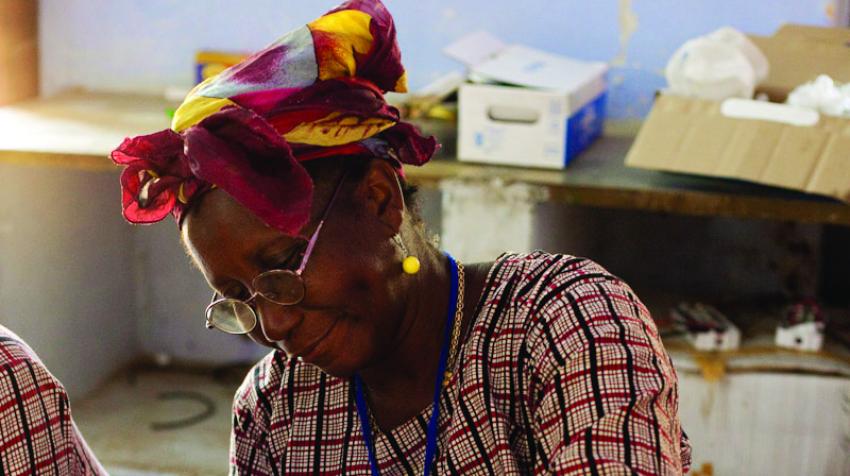
Fostering Peace and Sustainable Development
As transnational and global challenges become increasingly complex and intertwined, they pose a growing threat to sustainable development that no single country can tackle alone. This is a key reason why regional organizations such as the OSCE have an important role to play in supporting the 2030 Agenda.

A New International Law of Security and Protection
International organizations still have to operate within their mandates and are under the sway of powerful states or voting majorities. And yet, there is room for structural change in the content and procedures of international law of the future, which must become an international law of security and protection with the United Nations indispensably in the forefront.

Climate Change and Conflict: The Tail Wagging the Dog or New, Cascading Tensions and Inequalities?
Climate change continues to test our knowledge base, our governance mechanisms and coping strategies. However, looking at its impacts through the narrow filters of violence does fully capture the complexity of myriad social, cultural and economic change.

The Legacies of Armed Conflict on Lasting Peace and Development in Latin America
As a result of successful peace talks in Colombia, chances run high that, by the end of 2016, Latin America will be free from armed conflict for the first time in over 55 years.

Women's Participation in Transforming Conflict and Violent Extremism
In Khyber Pakhtunkhwa (KP) and the Federally Administered Tribal Areas (FATA), violent extremism is most acute, and women are on the front lines of warfare. They are the widows, victims and survivors of the suicide bomb blasts, the displaced and the traumatized.

SDG 7 and Sustainable Energy Development in Latin America and the Caribbean
We are still on the long road towards incorporating sustainable energy, but the global debate culminating in the approval of the SDGs framework in September 2015 has reached a monumental acceptance of energy as an essential tool within a sustainable development agenda. With this new mandate and with SDG 7 firmly supported by Member States and development partners around the world, it is now possible to integrate more sustainable energy systems that improve lives, promote inclusive and resilient societies, and provide sustainable development for the future we want.

Sustainable Development Goal for Energy and Information and Communications Technologies
ICT can play an important role in energy conservation and efficiency through sensing and control. ICT can also contribute to higher resource utilization through shared systems and increased efficiency driven through smarter appliances, infrastructure and manufacturing. Information systems can enable behavioral changes and reduce emissions by scheduling loads based on supply.

Achieving Sustainable Energy Targets in Bangladesh
Booming economic growth, rapid urbanization, and expanding industrialization and development have increased the country's demand for electricity. Renewable energy will play a vital role in meeting the demand for electricity, especially in the off-grid areas of the country.
The Future Role of SE4All in Promoting Sustainable Energy
Sustainable Energy for All (SE4All) is a call for both revolution and reform: a radical vision where everyone can access and afford the reliable energy they need to live a productive, healthy, secure life, while respecting the planetary constraints that we all face as a result of climate change.

The Road to a Sustainable Energy Future in Central America
Central American countries need to bring togetherthe efforts of regional, national and international partners to promote the policy coherence, institutional coordination, capacities and investments necessary to address energy poverty and develop a cleaner transport sector. These factors are a key to achieving sustainability in all dimensions of energy production and use.

The Role of Fossil Fuels in a Sustainable Energy System
The persistent critical challenge is to ensure an improved quality of life and economic growth, while reducing the environmental footprint of the energy sector. The transition to a sustainable energy system is an opportunity to improve energy efficiency from source to use, minimize environmental impacts, reduce energy and carbon intensities, and correct energy market failures.

The Impact of Renewable Energy Technologies on Global Energy Efficiency
Despite growing energy use, for the first time in four decades, global carbon emissions associated with energy consumption remained stable in 2014 as the global economy grew.

Developing Renewable Energy Sectors and Technologies in West Africa
By the time Sustainable Development Goal (SDG) 7, which seeks to ensure access to affordable, reliable, sustainable and modern energy for all, was adopted by the United Nations General Assembly, the member states of the Economic Community of West African States (ECOWAS) had already rolled out their regional road map and presented their national action agendas to attain it. The region seems to be on the fast track to getting out of the energy poverty trap.

Financing Sustainable Energy for All
For the global community, universal sustainable energy must be a top priority. We owe it to the 1.1 billion people still living without electricity and the 2.9 billion people still using polluting biomass fuels for cooking and heating.

Sustainable Energy for All: Empowering Women
Solar Sister is demonstrating the importance of women-led innovation in supporting the Sustainable Energy for All objectives related to universal energy access and renewable energy. Solar Sister has created a path for 2,000 women in Uganda, Tanzania and Nigeria to become active and knowledgeable participants in a sustainable, market-based clean energy distribution network, bringing clean energy access to over a quarter of a million people.
